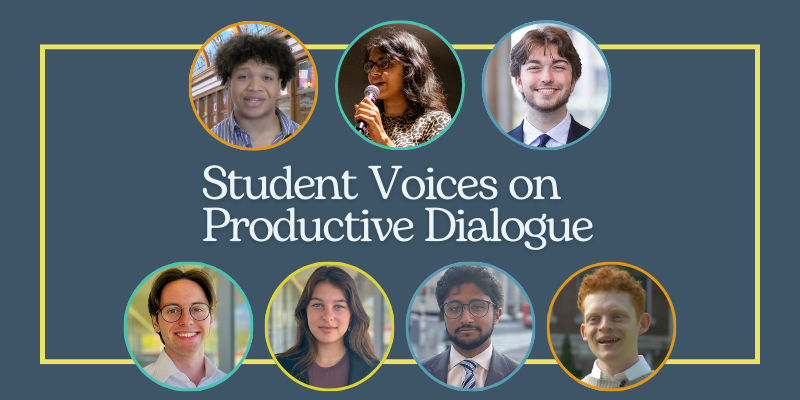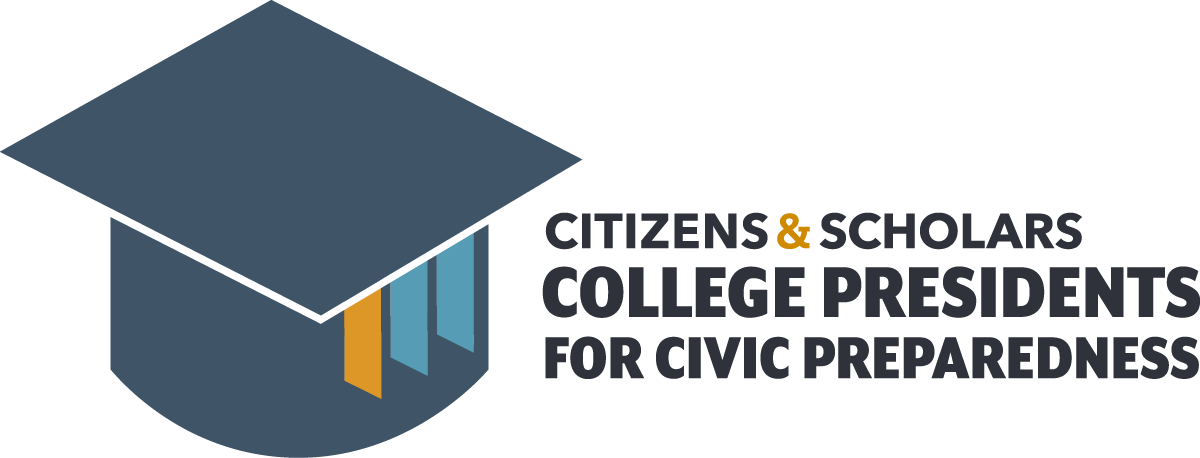Unscripted Student Voices Part One

Hear from the students leading the charge on campus productive conversations:
Claremont McKenna College
Hear from the student fellows participating in Claremont McKenna’s Open Academy:

Annie Bernstein ’27
I first became interested in fostering dialogue after participating in Hands of Peace, a three-week-long program for engaging in discussions concerning the Israel-Palestinian conflict. I’m excited to work with the Open Academy to foster a culture of understanding and mutual respect regarding controversial issues.
Abhi Ganesh ’26
I am eager to use the Open Academy to create a space where students can question the presuppositions that characterize our opinions on politics and culture in order to cultivate creative and inspiring dialogue on our species’ most pressing issues.
Jasper Langley Hawthorne ’27
I have an interest in the structures and stories that affect the modern world, and a desire to better understand the world through a free and constructive flow of ideas. I hope to foster beneficial discussions on the philosophical groundings of social media and the internet as a whole.
Read more.
University of Virginia
After the 2022 shooting at University of Virginia, student Jack Siegel felt an urgent need for more meaningful conversations on campus. That’s why he founded the Civil Discourse Initiative (CDI), a student-led group that fosters open, respectful discussions on divisive issues. But creating space for this isn’t always easy. From navigating tough conversations on abortion, immigration, and the election, to challenging misconceptions about Gen Z’s willingness to engage, Jack is proving that young people aren’t shying away from difficult conversations—they’re leading them.
Hear Jack’s interview.
Amherst College
President Michael A. Elliott of Amherst College talks with student and president of Amherst Political Union Lukas Luby-Prikot to discuss the challenges of navigating political conversations that can quickly turn divisive and confrontational. From the future of the Republican party to the Israel-Palestine war and the recent election, Lukas shares his perspective on finding common ground amid conflicting viewpoints. “We make it very clear that when people come in, there are some political perspectives that you must bring with you—that everyone is equal in dignity, and that everyone should be treated with respect.”
Listen to the full interview.
Wake Forest University
Wake Forest’s Leadership and Character Scholars Program is shaping students into leaders who understand the importance of community, values, and service. Austin Torain, a scholar from the class of 2024, sees himself as a bridge builder—someone who connects people across divides. For him, music is a powerful unifier, and engaging with others from different backgrounds is a way to learn, grow, and bring people together.
Hear Austin’s interview.
Video credit: Wake Forest University’s Leadership and Character Scholars Program
Washington University in St. Louis
Can conversations about difficult topics over a meal help lower the temperature? Washington University in St. Louis’ Dinner & Dialogue series shows that it’s possible. Part of The Civil Society Initiative, these events are bringing students together to discuss hot-button topics like immigration, Indigenous land rights, and the limits of protest. Two student leaders, Ben Ewer and Kate Farmer, talk about what it’s like to host these discussions and how they manage to bridge political and ideological divides.
Hear from student Ben Ewer on overcoming differences through thoughtful discussion:
In the class, I found we were easily able to navigate deep disagreements because we each shared (thanks to the structure and material of the class!) two beliefs about what were doing: (i) there is an answer to this difficult question and (ii) we want to find the right one. I thought this forced us to move beyond ourselves, that is, to make these questions less personal. The class wasn’t about justifying ourselves to others, but instead about thinking through difficult questions and subjecting ourselves to skepticism over the reasons we have to hold a respective value-based belief. These difficult (impossible, in some cases?) questions were approached more as problems to solve rather than things over which to fight. The result was, I thought, far-and-away the best discussions I have had in any class as an undergraduate. There is not really another forum on campus where someone can mimic these kinds of conversations, and certainly not one that is guided by someone who really knows the terrain, so to speak.
Hear from student Kate Farmer on the art of moderating hot topics:
Moderating the Is Protest Voting Wrong? Dinner & Dialogue event was an exciting way to apply my learning in a setting more akin to the real world than I normally would have access to as a student. Preparing the material for our discussion, I had to focus on not just the salient points of an issue, but also to anticipate the audience’s responses to it — who might disagree with this? What might their response be? How can I frame my thoughts in a way that fairly caters to all sides of the issue?
Or, even more challenging: if I think one side isn’t a valid one, how do I balance my sense of correctness with a sense of fairness to the speaker? There certainly were moments like this in my event, and as the moderator, I noticed the crowd watching for my reaction. One especially difficult moment came from an outspoken participant in the first row, who questioned me doggedly about widespread student voter fraud — asserting that most college students vote fraudulently and in multiple state elections at once, and that the integrity of our elections is therefore under attack. It was both off-topic and a perspective that most everyone in the room would say is factually inaccurate.
I made the decision not to censor or shut his comment down, but to nudge the speaker back towards the subject of the event, and then to open his comment up to others for response. The panelists and event participants gave him a resounding critical response, but in a way that actually addressed the substance of his concern, not merely dismissing his comments as crazy or heretical. It was heartening and also stimulating — as a student who often worries about self-censorship in herself and others, there’s a certain satisfaction in being able to look all perspectives in the eye, and for groups to work constructively towards addressing heterodox ideas without immediate rejection or disdain.
Read more.
